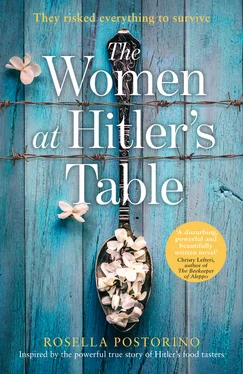The sun arrived by the time everyone had been pulled out. Our building hadn’t been leveled but the roof had a gaping hole in it. The roof of the building across from ours was entirely gone. Lined up on the street were the wounded and dead. Survivors leaned back against the wall, gasping for breath, but the fine debris had left throats stinging, noses clogged. Frau Reinach had lost her headkerchief, her hair clumps of smoldering dust that sprouted from her scalp like tumors. Herr Holler was limping. Pauline had stopped bleeding. I was intact, no aches, no pains. My mother was dead.
6 Contents Cover Title Page THE WOMEN AT HITLER’S TABLE Rosella Postorino Translated from the Italian by Leah Janeczko Copyright Epigraph Part One Chapter 1 Chapter 2 Chapter 3 Chapter 4 Chapter 5 Chapter 6 Chapter 7 Chapter 8 Chapter 9 Chapter 10 Chapter 11 Chapter 12 Part Two Chapter 13 Chapter 14 Chapter 15 Chapter 16 Chapter 17 Chapter 18 Chapter 19 Chapter 20 Chapter 21 Chapter 22 Chapter 23 Chapter 24 Chapter 25 Chapter 26 Chapter 27 Chapter 28 Chapter 29 Chapter 30 Chapter 31 Chapter 32 Chapter 33 Chapter 34 Chapter 35 Chapter 36 Chapter 37 Chapter 38 Chapter 39 Chapter 40 Chapter 41 Chapter 42 Chapter 43 Part Three Chapter 44 Chapter 45 Chapter 46 Chapter 47 Chapter 48 Notes and Acknowledgments About the Publisher
I would give my very life for the Führer,” Gertrude said, her eyes half closed to show her solemnity. Her sister Sabine nodded in approval. Because of her receding chin I couldn’t tell whether she was younger or older. The table in the lunchroom was bare. Only half an hour to go before we could leave. Standing out against the metal-gray sky framed by the window was another food taster, Theodora.
“I would give my life for him too,” Sabine said. “He’s like an older brother to me. He’s like the brother we lost, Gerti.”
“I, on the other hand,” Theodora said with a grin, “would have him as a husband.”
Sabine frowned, almost as if Theodora had disrespected the Führer.
The window fixtures rattled. Augustine had leaned against them. “Go ahead and keep him, your Great Consoler,” she said. “He’s the one who sends your brothers, fathers, and husbands out for slaughter in the first place. But then again, if they die, who cares? You can always pretend he’s your brother, right? Or you can dream he’ll marry you.” Augustine ran her finger and thumb down the corners of her mouth, wiping away frothy white spittle. “You’re ridiculous, all of you.”
“You’d better pray you’re not overheard!” Gertrude snapped. “Or do you want me to call in the SS?”
“The Führer would have kept us out of war if it had been possible,” Theodora said, “but he didn’t have a choice.”
“I take that back: you’re more than ridiculous—you’re fanatics.”
Though I didn’t know it then, from that point on “the Fanatics” would be our name for Gertrude and her little group. Augustine coined it while frothing at the mouth. Her husband had fallen at the front, that was why she always dressed in black. Leni told me that.
The women had grown up in the same town, and those of the same age had gone to school together. They all knew one another, at least by sight. All of them except Elfriede. She wasn’t from Gross-Partsch or the surrounding area, and Leni told me she’d never met her before we’d become food tasters. Elfriede too was from out of town, then, but no one was giving her any trouble over it. Augustine didn’t bother her. Augustine was nasty to me not so much because I came from the capital but because she saw my need to fit in, and that left me vulnerable. Neither I nor the others had ever asked Elfriede what city she came from, and she had never mentioned it. Her coldness left us apprehensive.
I wondered whether Elfriede had also fled to the countryside in search of peace and had immediately been recruited, just like me. On what basis had they chosen us? The first time I boarded the bus I had expected to find a den of zealous Nazis singing songs and waving flags. Soon I would realize that loyalty to the party hadn’t been a criterion in their selection, except perhaps in the case of the Fanatics. Had they enlisted the poorest ones, the neediest? The ones with the most children to feed? The women talked about their children nonstop, except for Leni and Ulla, who were the youngest ones, and Elfriede. They were childless, as was I. But they didn’t wear wedding bands, while I had been married for four years.
THE MINUTE I got home that afternoon, Herta asked me to help her fold the sheets. She barely even said hello to me. She seemed impatient, as though she’d been waiting for hours to be able to take care of the laundry and now that I had arrived she wasn’t about to wait one second more. “Bring in the basket, please.” She would normally ask me about work and then say, Go rest, lie down for a while, or she would make me some tea. Her brusque behavior today was making me uncomfortable.
I carried the basket into the kitchen and put it on the table.
“Come on,” Herta said, “hurry up.”
I pulled on the end of a sheet and tried to untangle it from the others without overturning the basket. Her rushing me made my movements clumsy. When I gave it one last tug to free it completely, a white rectangle fluttered into the air. It looked like a handkerchief. It was going to fall on the floor and my mother-in-law would be displeased. Only when it hit the floor did I realize it wasn’t a handkerchief but a sealed envelope. I looked at Herta.
“Finally!” she said, laughing. “I thought you’d never find it!”
I laughed too, with amazement, with gratitude.
“Well? Aren’t you going to pick it up?”
As I leaned down she whispered: “Go read it in the other room, if you like. But then come right back here and tell me how my son is.”
My dearest Rosa,
At last I can reply to you. We’ve been traveling a lot, sleeping in the trucks. We haven’t even changed our uniforms for a week. The more I travel through the streets and villages of this country, the more I discover there’s only poverty here. Its people have withered, the homes are hovels—far from a Bolshevik paradise, the workers’ paradise … We’ve stopped for the time being. Below, you’ll find the new address where you can send me letters. Thank you for writing so often, and forgive me if I write less frequently than you, but at the end of the day I’m exhausted. Yesterday I spent all morning shoveling snow out of a trench and then last night I stood guard for four hours (wearing two sweaters under my uniform) while the trench filled up with snow again.
Afterwards, when I collapsed onto my straw mattress, I dreamed of you. You were sleeping in our old apartment in Altemesseweg. That is, I knew it was our apartment though the room was somewhat different. The strange thing was that lying on the rug was a dog, like a sheepdog. It too was asleep. I didn’t even wonder what a dog was doing in our home, whether it was yours. All I knew was that I had to be careful not to wake it because it was dangerous. I wanted to lay down beside you, so I tiptoed over to avoid disturbing the dog, but it awoke and began to growl. You didn’t hear a thing, you kept on sleeping, and I called out to you, afraid the dog would bite you. Suddenly it barked fiercely and lunged—and just then I woke up. It left me in a foul mood for a long time. Maybe I was only worried about your journey. Now that you’re in Gross-Partsch I’m calmer. My parents will take care of you.
After everything you had been through, the thought of you all alone in Berlin was a torment to me. I recalled when we argued three years ago, when I decided to enlist. I told you we mustn’t be selfish or cowardly, that defending ourselves was a matter of life and death. I remember the period after the Great War—you don’t, you were too young, but I remember it well. Such misery. Our people were foolish, they let themselves be humiliated. The time had come to strengthen our resolve. I had to do my part, even though that meant leaving you. And yet today I no longer know what to think.
Читать дальше












